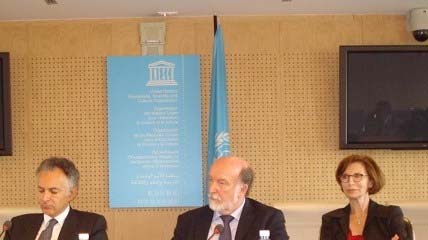Seventh Annual Holocaust Essay Laureates at UNESCO
July 11, 2011
CENTRE SIMON WIESENTHAL - EUROPE
66, rue Laugier
75017 Paris-France
Tel:+33(0)1 47 23 76 37
Fax:+33(0)1 47 20 84 01
66, rue Laugier
75017 Paris-France
Tel:+33(0)1 47 23 76 37
Fax:+33(0)1 47 20 84 01
Seventh Annual Holocaust Essay Laureates at UNESCO
"While Shoah was a media blindspot, contemporary atrocity often remains in the shadows. Where are the flotillas of indignation?"
Paris
The Russian University Holocaust Essay Competition was, for the seventh year, feted at UNESCO Paris Headquarters. Over 1,600 submissions from all over the former Soviet Union were judged by its competition coordinator, the Russian Holocaust Centre.
The five winners are invited to Paris by the French Association Verbe et Lumière - Vigilance (founded by the Simon Wiesenthal Centre - Europe), where they are received at UNESCO.
Director-General, Irina Bokova, called this essay contest "an integral part of UNESCO's efforts for young people in creating new educational material". She particularly mentioned the importance of Israel in its commitment to Holocaust memory.
Russian Ambassador and Chair of the UNESCO Executive Board, Eleonora Mitrofanova, stressed "the Nazi state murdered of 2 out of every 3 Jews in Europe and 3 million Soviet POWs... What was unique was the focus on killing Jewish children."
Moscow Parlementarian and Chair of the Russian Holocaust Centre, Alla Gerber, responded regarding the challenge of Holocaust memory in the former Soviet Union.
Keynote speaker, French Ambassador for Human Rights, François Zimeray, noted the misuse of language at Holocaust commemorations "where the Shoah is not present" -"When we read of the 'ghetto of St. Denis' and the 'Auschwitz of Gaza', then the ghetto was not a ghetto and Auschwitz was not Auschwitz..."
He called this "a semantic lie, a form of denial... Humanity has never had such means for knowledge, but, while Shoah was a media blindspot, contemporary atrocity is often left unseen in the shadows. There is no world mobilization. Where is the indignation? Where are the flotillas?"
Valeurs Actuelles Chief Editor, Michel Gurfinkiel, applied Emil Fackenheim's imperative to remember in an age of disappearing witnesses. He summarized the dilemma as : "How to transmit the untransmittable, while preventing its distortion and misappropriation...Holocaust Memorial Day must not become simply a world civic event that supplants its original victims ?"
Russian Holocaust Centre Director, Dr. Ilya Altman, introduced the five laureates,adding that the accumulated 35 winning essays since 2004, would hopefully soon be published :
- Anna Vitkina of the Moscow Maimonides State Classical Academy, reported on her sociological polls of Russian opinion on Holocaust memory, highlighting figures on ignorance and denial.
- Vladimir Karpov of Novgorod University Law Faculty, had researched the role of Nazi SS women executioners in concentration and death camps.
- Ekatarina Zlochevskaya of Moscow State University's Institute for African and Asian Studies, wrote on Jewish Resistance in Lithuanian Ghettos through Diaries and Memoirs.
- Anastasia Rogova of Nizhny Novgorod State university History Department, researched attitudes toward the Holocaust of the Churches, principally the Russian Orthodox.
- Nikita Dunets of the Belarus State University of Minsk Department of International Relations, analysed Jewish partisan resistance in Belarus through documents on the Bielski brothers.
Mark Richmond of UNESCO Education Department, commented that "education on the Holocaust was not enough, but it is a point of departure," emphasizing UNESCO's commitment to these projects.
Linda King,UNESCO Holocaust pedagogy expert, noted that "Holocaust denial is part of normal language, often implicit by insinuation...in the case of school textbooks, denial can also be in saying nothing."
Diplomatic delegates of Germany, Israel, Russia and the United States participated in the meeting, which was chaired by Simon Wiesenthal Centre Director , Dr. Shimon Samuels, who summarized the proceedings ironically as : "When Memory becomes History". He thanked UNESCO Diplomatic Advisor, Dr. Graciela Samuels for her coordination of this challenging session and Protocol Officer, Kendal Segre for her guidance. A vote of thanks was given by a Verbe et Lumière - Vigilance trustee, Alexandre Kaplan.
For further information contact Dr. Shimon Samuels on 0033(0)609770158

UNESCO Director-General Irina bokova surrounded by the four Russian and one Belarus essay laureates; Russian Holocaust Centre Chair, Parliamentarian Alla Gerbee and Director, Ilya Altman; Russian Ambassador Eleonora Mitrafonova, Delegates of Germany, Israel and the United States; UNESCO officials Education Chief Mark Richmond, Holocaust Coordinator Linda King, Diplomatic Advisor Graciela Samuels; representing Verbe et Lumiere-Vigilance Shimon Samuels

Keynote Speaker French Ambassador for Human Rights, Francois Zimeray with Mark Richmond and Graciela Samuels


Russian Parliamentarian Alla Gerber and Ambassador Mitrofanova
The group at the UNESCO Rabin Tolerance Memorial
- Regional Offices
- Los Angeles
- New York
- Midwest US
- Southern US
- Toronto
- Jerusalem
- Paris
- Buenos Aires


